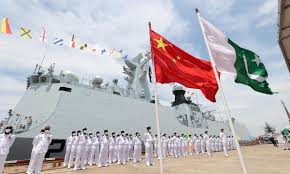
KARACHI, Apr. 5 (INP): Pak-China marine coop is must to eradicate bycatch and raise income, said Muhammad Moazzam Khan, WWF-Pakistan’s technical adviser for marine fisheries, according to a report published by Gwadar Pro on Wednesday.
Both China and Pakistan enjoy long coastlines and diverse marine life species. “Therefore, the long-term sustainable cooperation strategy under the CPEC framework is of great benefit.” Shoaib Kiani, Assistant Professor at the University of Karachi’s Institute of Marine Science believes the two countries should cooperate to train fishermen and related ecological protection personnel, and even establish work group to hold regular exchange meetings.
Shoaib Kiani stressed that the regulations need to be upheld. “At present, a number of excellent academic papers related to marine biology and ecological protection have emerged in Pakistani academic circles, reflecting our great potential in the field of scientific research and technology.
The only problem is financial support and resource allocation. Sustained development goes hand in hand with improving fisher livelihoods, which are going to benefit generations to come.”
“We had set up a fishing net and were anxiously waiting for the catch,” said the fisher that lives in the coastal village of Ibrahim Hyderi, Karachi, “we suddenly felt something moving and pulling the net away from the boat. It was a huge green turtle struggling to escape. We safely released this gentle giant, witnessing it flip back into the waters.”
In 2018, Shakil became one of around 700 people who have received training from WWF-Pakistan under its Sustainable Fisheries Entrepreneurship Project, which has been operating in Ibrahim Hyderi and nearby village of Rehri Goth. The aims of the project, which is supported by the Engro Foundation, include reducing bycatch and creating additional livelihood opportunities to make fishing on Pakistan’s coast more sustainable.
Before 2012, about 28,000 turtles and 12,000 dolphins would be caught every year in fishing gears-gillnets, seine nets and trawling that trap marine animals indiscriminately-in Pakistan’s waters, said Muhammad Moazzam Khan, WWF-Pakistan’s technical adviser for marine fisheries. Nearly all entangled dolphins would die due to suffocation.
“UN regulations and agreements stipulate that drift gillnets should not be more than 2.5 kilometres long. Despite this, our fishers use nets that are 4 to 6 kilometres”, noted
“Fish populations in Pakistan’s waters have fallen by 40-80 percent. Fishery reform is imperative, in which rescue and safe release programme is not enough.”
Prof Kiani describes longline fishing using a single fishing line, along which are hung as many as 4,000 baited hooks, and sub-surface gillnets as “suitable fishing practices”, stating that entanglement of threatened and endangered species has been significantly reduced where the WWF-Pakistan measures have been adopted. “There is still a need to raise awareness among fishers, and for the government to regulate fishing practices.
Other new equipment can reduce bycatch at the source. According to Prof Kiani, fishing gears equipped with LED lights has been distributed to fishermen in some pilot areas, which can reduce the impact on non-target species such as sea turtles under various light conditions.
Regarding the marine ecological protection that all mankind must pay more attention to, Chinese experts have also put forward suggestions from different levels, “Pakistan has very rich marine and inland fishery resources, including nearly 250 species of bottom fish and 85 species of pelagic fish, as well as 15 species of commercial shrimp, 12 species of cephalopods and 5 species of lobsters.
Precious fishery resources, as the fairest public goods, require systematic protection measures,” Dr. Zhou Jinfeng, Vice Chairman and Secretary-General of China Biodiversity Conservation and Green Development Fondation, told the reporter that in line with the standards issued by the Ministry of Agriculture of China, the minimum mesh size of fishing nets is 25mm.
In addition, the setting of closed fishing seasons and areas are of great importance, in which the sea is closed from May 1st to September 1st every year to fully protect marine life during the breeding period.
Nevertheless, at the public level, the instillation of awareness including marine ecology and resource protection is a top priority. In this connection, Prof Kiani and Dr. Zhou happened to coincide with each other. “Only by ensuring the income of fishermen can sustainable fishing methods be implemented more easily,” Prof Kiani mentioned, “Longline fishing allows fishermen to catch more big fish.
However, it costs about Rs 900,000 (about USD 3,400) to equip a boat with its equipment, half of which is borne by WWF-Pakistan. So far, a total of 980 fishermen in Ibrahim Hyderi and Rehri Goth are using longlines, and their income has tripled compared to their peers who still use gillnets.
It bodes well for both the ocean and the people. Whereas, only about 4 percent of Pakistan’s fishing fleet has converted to sustainable methods. “Many Pakistani fishermen have an annual income of only USD 2,300, and the cost of installing longline fishing is unaffordable to them. Fishermen will ignore potential future benefits because of the temporary high cost,” Dr. Zhou emphasized.
“The reform of fishing gear requires a multi-pronged approach. Above all, government departments must further increase financial support to ease the economic pressure of fishermen; second, the assistance of relevant international maritime organizations or fishery organizations needs to be strengthened.
In addition, public education, including fishermen and children, can be done with the help of NGOs. All in all, the long-term benefits of reforming fishing gear are greater than the short-term benefits, which fishers must deeply understand, to reach the target of sustainable fishery in the long run.”







